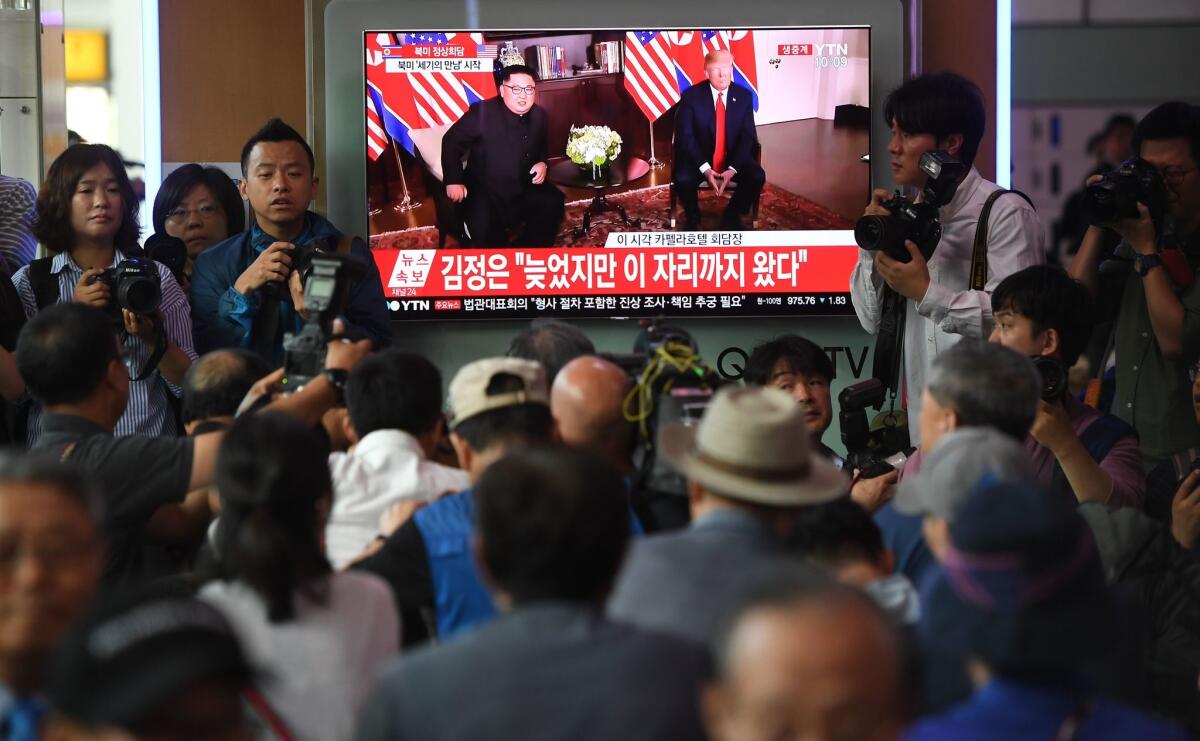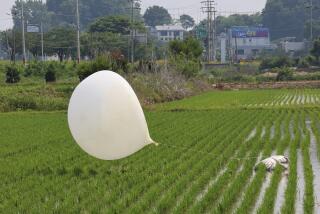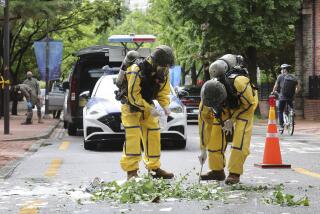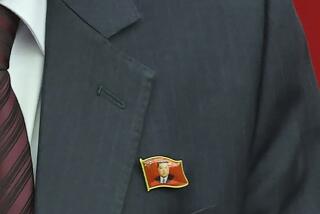South Koreans are left wondering: Are we better off than we were a week ago?

South Koreans of a certain generation remember a hit children’s animation from 1978, featuring as its hero a Tarzan-like boy who battles an army of North Korean soldiers, depicted as packs of rabid wolves.
By the end of the anti-communist movie, through the courageous feat of the protagonist Ttoli, the corpulent villain “Red Marshal,” who engorges himself while exploiting his own impoverished people, is unmasked and shown for his true self. As it turns out, the villain — unmistakably modeled after North Korea’s founder, Kim Il Sung — was a pig.
That was then. In recent days, people in South Korea watched as Kim Jong Un, the North’s latest dynastic ruler and the spitting image of Kim Il Sung, his grandfather, appeared to step into a new chapter, styling himself as something of an antihero for peace on the Korean peninsula.
Days after Kim’s improbable meeting with President Trump, a first between a sitting U.S. president and a North Korean head of state, South Korea was still parsing the exact ramifications of the summit. The joint agreement signed with much fanfare included no specific or new commitment for the North to relinquish its nuclear weapons, and Trump almost offhandedly announced that military exercises between the United States and South Korea would end, and that he would like to see the eventual withdrawal of some 28,000 U.S. troops on the peninsula.
Trump’s announcement about the military exercises seemed to have blindsided officials in Seoul, leaving many South Koreans unsure of how to react to the outcome of the historic summit.
It’s just words. A feast of words. A festival of words.
— J.S. Choi, a businessman in Seoul
“It’s a first, so I think it’s encouraging. From South Korea’s perspective we’d of course rather they talk than be antagonistic,” said Lee Hye Ran, 35, a campaign manager at a nonprofit promoting fair trade. “But there are no specifics on where it goes from here, and the lack of detail is disappointing.”
Lee said Tuesday’s summit between Kim and Trump seemed to be a bigger deal among her friends than the World Cup soccer games that started two days later. Some companies went so far as adjusting work hours so employees could watch the livestream of the summit.
In the bustling commercial district of Gangnam, made famous by Psy’s 2012 viral hit, it was business as usual this past week, any changes in the potential of nuclear war notwithstanding. Lee said she was tied to her desk, itching to watch history unfold.
South Korean President Moon Jae-in and his defense minister said they would “carefully consider” suspension of the exercises, sparing words in responding to the announcement.
Immediate reactions to the summit were divided along political lines, as they are apt to be in South Korea.
Chosun Ilbo, an influential conservative daily, panned the summit, saying it was “the worst outcome for South Korea.”
“Whatever one may think of him, the young North Korean leader has made an incredible achievement simply by getting Trump to meet him,” the paper said in an editorial. “It is simply unbelievable that Trump flew all the way to Singapore to end up with the short end of the stick.”
“This is diplomacy for the kindergarten,” the editorial said.
The liberal Hankyoreh newspaper struck a much more upbeat note, saying Trump and Kim “opened the door to a new era … by taking their first step on the road to peace, a road that has never been taken before.”
The paper did add, though, that the lack of any details or timetable on the actual dismantling of North Korea’s nuclear capabilities was “somewhat unfortunate.”
For his part, Moon, a liberal president who was arguably the major driving force behind the meeting between Trump and Kim, attempted to play up the hopeful voices in his country and discredit the skeptical ones.
“South Koreans are enthusiastically supportive of the outcome of the U.S.-North Korea summit,” Moon told Secretary of State Mike Pompeo on Wednesday, according to Moon’s spokesman. “A few experts are giving low marks to the summit results, but that is a far cry from the public sentiment.”
A Gallup poll released Friday did appear to back Moon’s assertion. In a survey of about 1,000 South Koreans, 66% said they thought the summit was successful, with just 11% saying it was not. More than half the respondents said they believed North Korea would stick to its pledges, while about a quarter said they didn’t think it would.
A separate poll two weeks earlier, before the summit, found a sharp jump in South Koreans’ attitudes toward Kim, with 31% expressing a positive view, up from 10% in March.
J.S. Choi, a 70-year-old businessman, was among the skeptics. He said he gave little weight to the vague promises of the North Korean leader.
“Kim Jong Un is like a rugby ball. You never know where it’s going to bounce,” said Choi, who runs an import-export company. “We’ve been through this before, we’ve been lied to before. What’s actually been accomplished?”
Choi was flipping through a book on Kim Il Sung at a Gangnam bookstore, where the section on books about North Korea was largely deserted Friday afternoon. Far busier were sections on self-help, employment exams and cryptocurrency.
A South Korean soldier in army fatigues on leave from his base in the border region of Cheorwon said he had been too busy with his day-to-day duties to watch the summit or read about it. He said he hadn’t heard about the discontinuation of military exercises, and with six months left in his military service, which is required of all South Korean men, he was preoccupied with looking for a book on the civil service exam.
Choi, though, had read through almost all the hot new books on North Korea. He said what really mattered were the behind-the-scenes working-level talks between Trump’s and Kim’s deputies, the details of which haven’t been made public.
As for the talks, which he watched live from his home in Seoul, he said: “It’s just words. A feast of words. A festival of words.”
Among his friends, members of a generation that remembers the tensions following the Korean War, negative responses to the summit were predominant, he said. That especially seemed to be the case for friends who emigrated to the U.S., many of whom he said left the country fearing another war with North Korea.
Younger South Koreans appeared more eager to do their part to make entreaties across the demilitarized zone separating the two Koreas.
Students at Seoul National University said Friday they sent an email to their counterparts at Pyongyang’s Kim Il Sung University, suggesting they meet in the North Korean capital as soon as this summer. They told reporters they were able to confirm that the email was read, and were anxiously awaiting a reply.
Lee, the nonprofit worker, was more tempered in her enthusiasm. She said the meeting between the U.S. and North Korea was significant but said the talks also carried risks of relations deteriorating if they fall through. She said she found it disappointing that Moon appeared to not have been fully looped in.
“But nothing will get resolved if they don’t talk,” she said. “I’m trying to look at it in a positive light.”
victoria.kim@latimes.com | Twitter: @vicjkim
More to Read
Sign up for Essential California
The most important California stories and recommendations in your inbox every morning.
You may occasionally receive promotional content from the Los Angeles Times.










